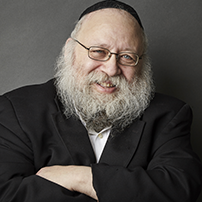
Dvar: A Superfluous Word?
Ki Seitzei is the richest parsha in terms of its number of commandments. One of those commandments relates to the two nations of Amon and Moab:
“An Amonite or Moabite shall not enter the congregation of G-d, even their tenth generation shall not enter the congregation of G-d, for eternity, because of the fact that they did not greet you with bread and water on the road when you were leaving Egypt, and because he hired against you Bilam son of B’or, of Pethor, Aram naharaim, to curse you.”
The Hebrew text seems to have an unnecessary word, dvar, which translates as “the fact” or “the matter.” The text could have tightened the sentence by stating simply: “because they did not greet you…” This is problematic considering the way the Torah is so economical with words.
One approach to this question is based on Rashi’s comment that the reason the Torah banned marriage with the Amonite and Moabite people is that they caused the children of Israel to sin. And whereas the Edomites and Egyptians were allowed to marry into the Jewish community after three generations, even though they physically persecuted the Jewish people, the Amonites and Moabites were banned for eternity. The reason for this discrepancy, Rashi explains, is that one who causes others to sin commits a more egregious sin than one who physically kills. The latter destroys the body but the former destroys the soul.
The Kli Yakar suggests that this is what the Torah alluded to when it added the superfluous dvar-the matter. It hints to the “matter” of causing the children of Israel to sin.
The fact that the Torah does not mention that sin as the rationale for their uncompromising exclusion from the Jewish people, but supplies another reason is no contradiction. The Kli Yakar explains that the failure to give the Israelites bread and water was not just a sign of their inhospitable nature. Their denial of bread and water was a ruse to get the children of Israel to partake of idolatrous offerings instead of bread, and drink wine, instead of water, which caused their morals to degenerate into consorting with the Moabite daughters.
Two Forms of Evil
The work Mishmeres Elazar provides another explanation for the Torah’s seemingly redundant use of the word dvar, by slightly changing the translation of the word from “matter” to “word” which then alludes to the worse of two forms of evil:
The first, more common and less egregious form of evil, is impulsive. The penalty for this form of sin is less severe because it is a product of “temporary insanity,” consistent with the Talmudic maxim: “One does not transgress unless a spirit of folly enters him.” The Yetzer Hara-evil inclination enters one’s consciousness without warning, sows confusion and a human being composed of a physical body with physical instincts succumbs to the drive of the evil impulses. A human being may not have the time and the energy to mount a forceful response. While blaming the Yetzer Hara is not a legitimate defense, it does mitigate somewhat the severity of the crime and results in a lighter punishment.
The second more serious form of evil are the actions taken in a conspiracy. When people conspire to commit a crime, it is a far more severe sin than one committed impetuously. They cannot argue that they had no time to consider the severity and consequences of their actions. Not only did the conspirators methodically plan their crime, they also reinforced their evil by discussing it and colluding with others. This more egregious form of evil results in harsher penalties as well.
This then is the meaning of the added word dvar, translated as the “word,” referring to the exchange of words among the collaborators in their conspiracy. Not only were the Amonites and Moabites guilty of inhospitality, they conspired so that not even one member of their nation would supply the children of Israel with bread or water. This was a sign that they were bereft of human decency and were therefore precluded from marrying into the Jewish community for all time.
This explains why their exclusion from marrying into the Jewish people was due to what appears at first glance to be a relatively minor transgression. Why would the penalty for their lack of hospitality be so severe, when other nations committed far more horrific crimes against the Jewish people and yet they are allowed to marry into the Jewish people (after proper conversion)?
The answer is that it was not just a sin of omission but a sin of commission; they conspired against the Jewish people and that it involved the entire nation.
The Royal Power of Speech
We can propose another explanation for the addition of the word dvar given its translation as “word.” It may allude to the idea of monarchy, based on the verse in Koheles (8:5): “Inasmuch as a king’s command [dvar melech] is authoritative, and none can say to him ‘what are you doing?’” The power of the king to control his country is exercised through his decrees. Indeed, Kabbalah identifies the attribute of Malchus-royalty with the power of speech. The Torah may be hinting here that Moab’s failure and its censure lay in its skewed model of leadership. Hence, its inclusion within the Jewish people would have tainted our status as positive leaders.
To explain further: The Ba’al Shem Tov taught that every Jew possesses a spark of Moshiach.
If, as stated in Koheles, a king rules by his power of speech, then we can say that it is this same spark of royalty that empowers us to influence and inspire the world with our power of speech.
According to the Chassidic Master, Rabbi Mendel of Kotzk, the Jewish people borrowed the power of royalty from the Moabites through Ruth (who was a Moabite princess). She converted to Judaism and married Boaz, the great-grandfather of King David. As the Talmud makes clear, the prohibition against marrying a Moabite extended only to the males. After all, they were the ones who corrupted their innate power of leadership by not greeting us with bread and water. The women could not be faulted for that.
Moshiach, the ultimate human king, will be a model and paragon of kindness and generosity. Thus, we find regarding Joseph that his leadership as viceroy of Egypt manifested itself in his “supplying grain to the entire land.”
Hence, the Torah, by adding the word dvar-speech, provides us with a hint as to the problem with Moab’s evil. Inclusion within the Jewish people would have tainted the power of leadership of the Jewish people even to the extent of affecting Moshiach.
Moreover, the second reason for the prohibition against Moab is that it hired the heathen prophet Bilam to curse the Jews. This reason, too, points to the extent to which they corrupted the power of royalty by utilizing the power of speech for the purpose of cursing the Jewish people. There can be no greater repudiation of the Messianic goal than to pervert the royal and holy power of speech. It is also no surprise that one of Bilam’s blessings, which he intended as a curse, revolved around Moshiach. His intention was to use the power of speech to undermine Moshiach, the ultimate possessor of the power of influence.


